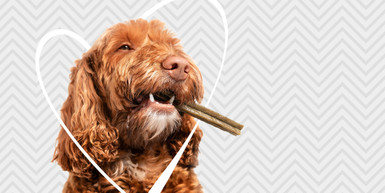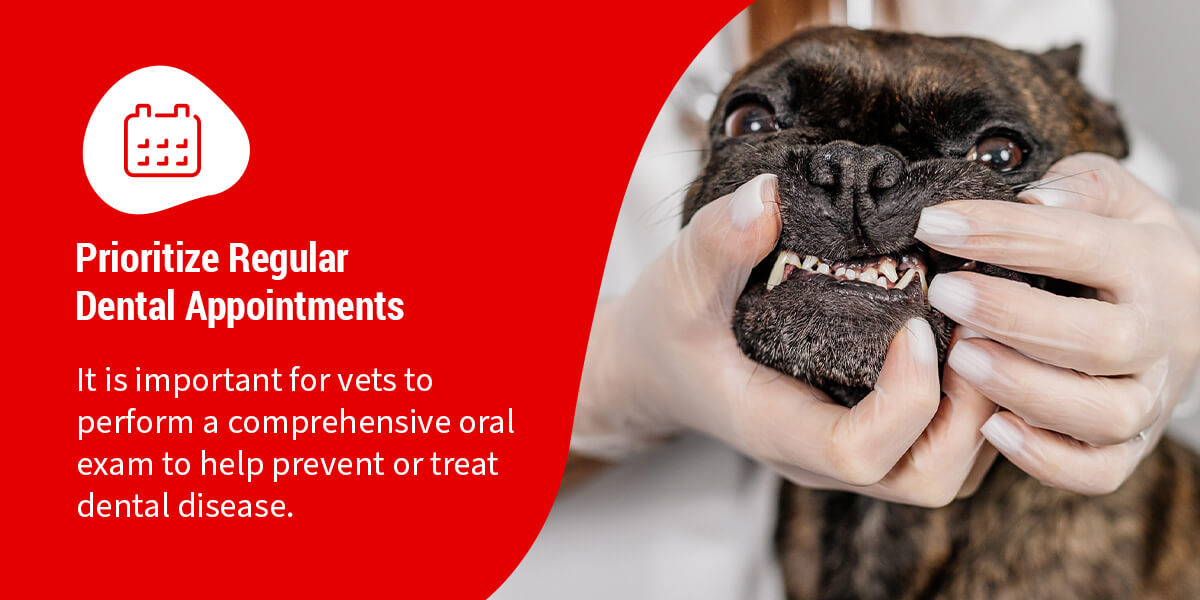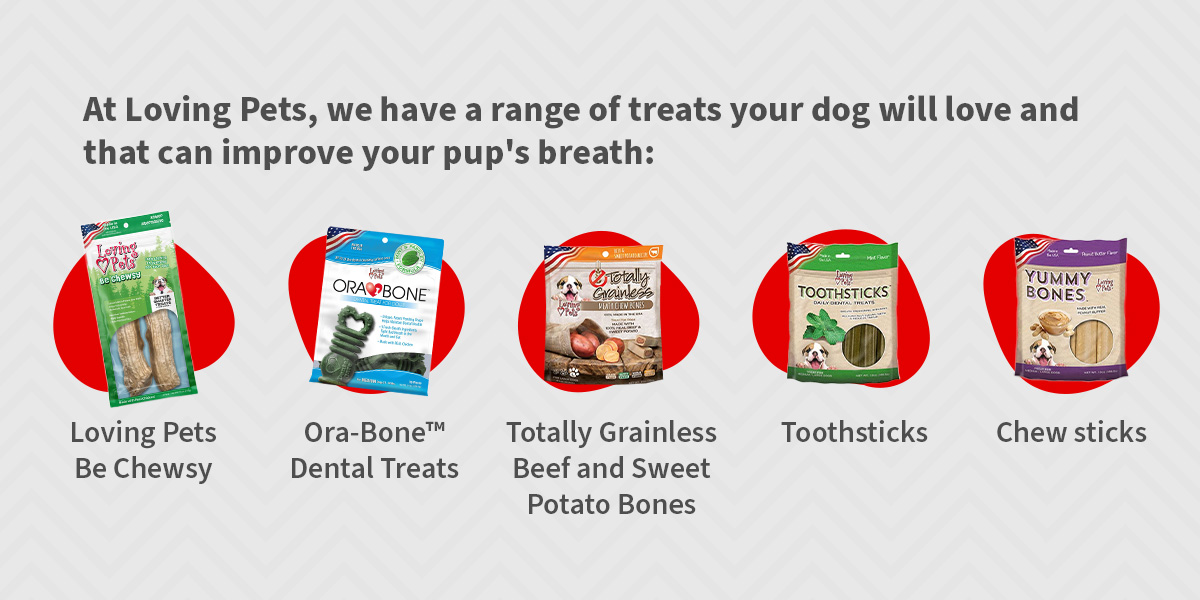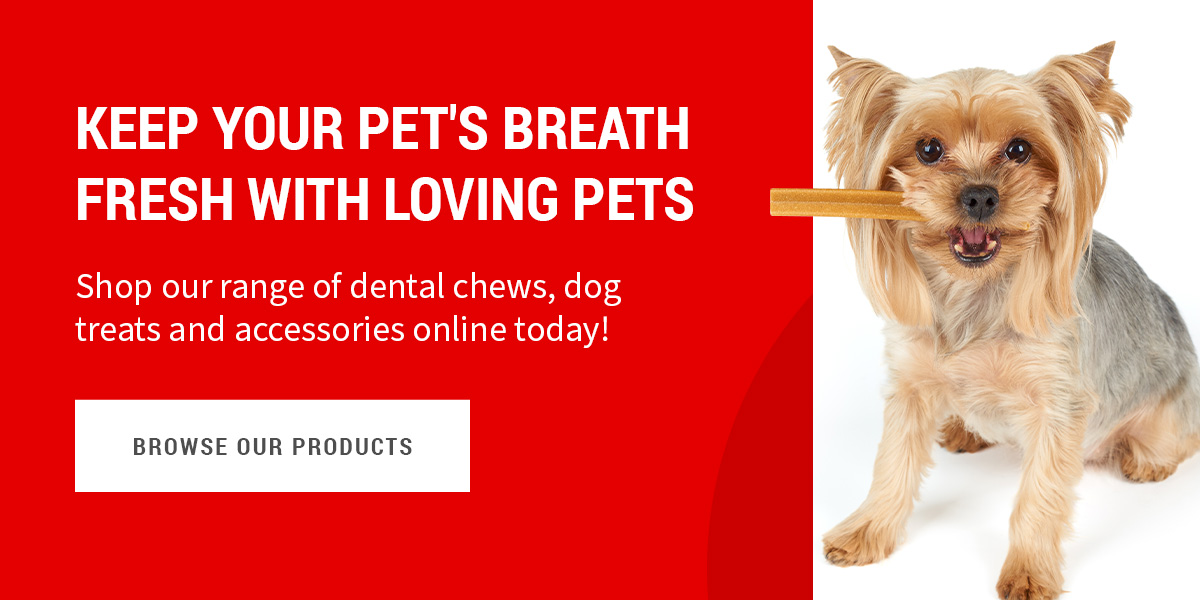How to Get Rid of Bad Dog Breath
There is nothing quite like your dog's unconditional love and affection. While nothing can stand in the way of that, it certainly isn't pleasant when your dog is dealing with stinky breath. Your dog's bad breath is more than just a nuisance — it may be a sign that you can make changes to improve their health and well-being.
There are various remedies for bad dog breath, from simple dietary changes, hygiene practices and giving your pup minty dental sticks to visiting your vet.
Understanding the Causes of Bad Dog Breath
Understanding the causes of your dog's bad breath can give you peace of mind and help you find the right remedy so that you can spring into action.
These are some of the causes of bad breath in dogs:
- Poor dental hygiene: Our furry friends aren't all that different from us! They get tartar buildups and plaque just like we do. If you aren't regularly brushing your dog's teeth and implementing other good oral hygiene habits, it can lead to a buildup of bacteria that affects your dog's breath.
- Periodontal disease: Periodontal disease, or periodontitis, is one of the most common dental concerns vets see in dogs. It is caused by the buildup of plaque and tartar and causes inflammation that affects the teeth, gums and bones. Left untreated, it can lead to bad breath, gum infections, teeth and bone loss, and other serious health conditions.
- Gastrointestinal issues: Your dog's bad breath may indicate gastrointestinal problems, including malabsorption, ulcers, intestinal obstruction, gastritis, constipation, bloating or serious infections like canine parvovirus. Always take your dog to the vet if you suspect gastrointestinal issues, as they can be serious.
- Incorrect diet: Your dog's diet can cause bad breath. Sometimes, bad breath results from eating strong-smelling foods like liver or fish, but this type of stinky breath is only temporary. It is also good to note that certain foods are not good for your dogs and should be excluded from their diets. This includes grapes, onions, chocolate and even bones, which can be choking hazards.
- Health conditions: Certain health conditions can cause extreme bad breath in dogs. For example, kidney disease causes the kidneys to battle to process and filter waste materials and toxins. This leads to a buildup that can cause bad breath and affect your pup's breath. If your pup has bad breath, vomiting and diarrhea, they could have liver disease. If your dog has bad breath with hints of sweetness, they may have diabetes. In any case, you'll want to visit your vet as soon as you can.
- Lodged objects: Dogs love to chew on all sorts of things, and sometimes, pieces of foreign objects, like a fragment of bone, get lodged in their teeth. This can easily breed bacteria and lead to smelly breath. If you suspect they have something lodged in their mouth, you'll want to take them to the vet to get checked out.
How to Treat Bad Dog Breath
These tips will show you what to do for bad dog breath.
1. Prioritize Regular Dental Appointments
Perhaps you've heard the myth that dogs don't need special dental care because chewing naturally cleans their teeth. Well, this isn't exactly true! Your dog's dental health is crucial to their overall well-being. This means you should schedule regular checkups with your vet, specifically focused on oral health.
It is important for vets to perform a comprehensive oral exam to help prevent or treat dental disease. For a vet to complete a proper dental exam, dental treatment or cleaning, they will likely put your dog under anesthesia. Here is what you can expect when you take your dog for a dental care checkup:
- Your vet may run a basic health check to ensure your pet is healthy enough to undergo dental procedures such as cleaning. They may check your dog's heart to ensure he or she can tolerate anesthetic.
- Your vet may also perform bloodwork on your dog to check their kidneys and liver and ensure they can handle sedation.
- Once the vet has determined your dog is fit for sedation, they will use a general anesthetic.
- The vet will examine all your pup's teeth and look for signs of dental issues, including bad breath, extra teeth, bleeding, swelling, plaque and tartar buildup, broken or loose teeth, discolored teeth, and discolored teeth.
- The vet will clean your dog's teeth and perform any other necessary procedures.
- Your vet will follow up with you and may give you some insights into what you can continue doing at home to treat your dog's bad breath and care for their oral health.
2. Brush Your Dog's Teeth
It is never too late to get into the habit of brushing your dog's teeth. A good goal is to brush your pup's teeth two to three times a week. However, not all dogs are keen for you to brush their teeth. In this case, brushing as often as possible and supplementing with dental chews and other good practices is better than nothing!
These tips can simplify cleaning your dog's teeth — for both of you:
- Get the right supplies: Start off by getting a toothpaste and toothbrush made for dogs. This is vital, as dog toothbrushes have softer bristles and are at the right angle for canine teeth, and human toothpaste is unsuitable for doggies.
- Choose the right time: Pick a time of day when your dog is calm and relaxed.
- Sit comfortably: Kneel or sit in front of your dog or to their side. Both of you should be in a relaxed and comfortable position.
- Check their readiness: Applying light pressure, rub your finger along your dog's teeth and gums to check their readiness for you to brush their teeth.
- Let them taste the toothpaste: Let your dog lick the toothpaste from your finger so they can become familiar with it.
- Get brushing: When they're ready, try using the brush. Angle the bristles toward the gums and move in a circular motion, brushing each tooth gently but thoroughly.
- Reward your pup: Reassure your doggie throughout and congratulate them for a job well done afterward!
Some light bleeding while you brush is perfectly normal. If you notice heavy bleeding, you may be brushing too hard, or the blood may indicate gum disease. Speak to your vet if heavy bleeding is a concern.
3. Feed Your Dog a Healthy Diet
When getting rid of smelly dog breath, sometimes simple dietary changes are all it takes! Feeding your dog a diet of healthy, quality foods is one of the best remedies for a dog's bad breath. A dog's diet also makes a world of difference to their energy levels and overall health.
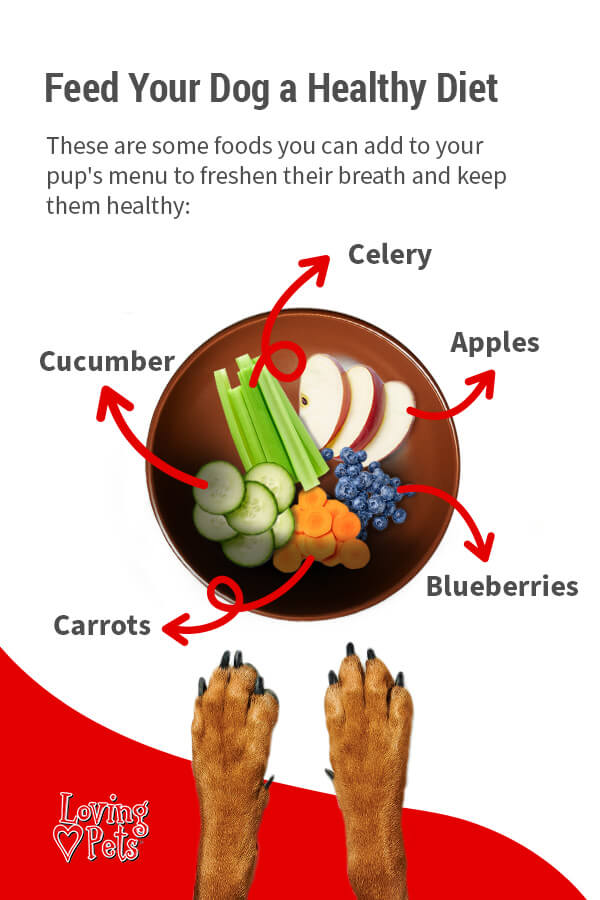
These are some foods you can add to your pup's menu to freshen their breath and keep them healthy:
- Apples: Apples are an excellent source of fiber, antioxidants, vitamins C and A, and potassium. Apple slices are a great low-calorie, sweet treat for your dog, but giving them a whole apple could be too much sugar. Rather, slice the apples up and give them a few yummy pieces. Even though the skin has plenty of nutrients, it may get stuck in your dog's teeth, so consider peeled slices, too.
- Blueberries: Your pup can happily munch away on small amounts of blueberries. They are full of antioxidants and minerals and contain fiber and vitamin C. Your dog can have frozen and or fresh blueberries — just make sure you wash them first. If you are worried about your dog swallowing whole berries, you can also mash them up or puree them.
- Carrots: Carrots are high in fiber and beta-carotene, which converts to vitamin A. They are another low-calorie, healthy treat for pups that can improve your dog's dental health — and breath! Make sure to wash carrots thoroughly and cut them up into bite-sized chunks to prevent choking.
- Celery: While celery isn't important to a dog's diet, it does make a good low-calorie treat. It is a good source of fiber and contains a range of vitamins and minerals. Best of all, celery can help freshen your dog's breath!
- Cucumber slices: Many dogs love cucumbers! They are safe for dogs to eat, crunchy, cool and refreshing. Cucumbers have a high water content, making them the perfect snack for a hot day. Because of the high water content and freshness, cucumbers may help freshen your pup's breath! As you would with other fruits and veggies, cut the cucumber into bite-sized pieces and only really give it to your dog as a treat.
Another way you can boost your doggie's diet is by adding canine vitamins and supplements to their daily intake.
4. Give Your Dog Dental Chews
If your pet has smelly breath, go ahead and treat him or her to some breath-freshening dental treats! When dogs chew actively, it stimulates their saliva glands. Your dog's saliva has natural antibacterial properties that can control plaque buildup and help your pup maintain good dental health.
Since dental chews help your pup chew more and enjoy a healthy release of saliva, they can also help freshen your dog's breath! At Loving Pets, we have a range of treats your dog will love and that can improve your pup's breath:
- Loving Pets Be Chewsy: Our very own Be Chewsy treats are great alternatives to some of the interesting things dogs love to chew on! Choose from Be Chewsy Antler Alternative Chews, Be Chewsy Bully Stick Alternative Chews and Be Chewsy Pig Ear Alternative Chews. These quality products are tasty, more easily digestible and made with less fat than alternatives.
- Ora-Bone™ Dental Treats for Dogs: These awesome treats are designed to combat your pup's bad breath! They contain parsley and mint to help freshen up your dog's breath. These dental treats also have up to two times the cleaning surface area of similar chew products. There are even nips around the ends that scrape the tongue, leaving your pup's breath even fresher!
- Totally Grainless Beef and Sweet Potato Bones: These tasty treats have a soft center and a hard exterior — much like a real bone. Your dog can enjoy two delicious flavors with this grain-free, gluten-free and corn-free treat.
- Toothsticks: Toothsticks Daily Dental Treats are bound to become a favorite treat for many dogs. Chewing them helps reduce tartar and massage the gums. Best of all, these chicken snacks are flavored with mint, parsley and alfalfa to promote fresh breath!
- Chew sticks: The chew sticks fromYummy Bones come in multiple flavors, including chicken, peanut butter, bacon and — a favorite for fresher breath — mint!These grain-free treats will satisfy a variety of canine taste buds.
Remember, it is still important to prioritize dental checkups and tooth brushing, but these dental treats can help out between cleanings — especially if your pup isn't fond of the toothbrush!
5. Try Water Additives
Water additives are like a dental wash product that you add to your dog's drinking water. They are designed to make dog breath smell better and aid your pup's oral health.
It's wise to consider the ingredients and be cautious when choosing water additives. Most water additives are completely safe for your pup, but some, unfortunately, contain potentially harmful ingredients. For example, avoid water additives that contain xylitol, an artificial sweetener that is extremely toxic to dogs, and chlorhexidine, which should only be used as a topical treatment.
You can also try making your own canine water additives at home using natural products like parsley and mint. You can add sprigs of these herbs to water, boil it to let it steep, cool it and then serve it to your pup in their water bowl.
6. Doggie-Proof Your Home
Dogs are masters of adventure, but sometimes this means they get into all the places they shouldn't — your pantry, the trash cans, you name it! Getting into the trash cans and nibbling at discarded foods and other items can definitely impact their breath.
Doggie-proofing your house is the answer! Try blocking off those areas so that your pup can't reach foods that could make them sick, like your stash of chocolates, and so that the trash is out of their reach.
When to Visit Your Vet
Your pup's bad breath may not be cause for worry, especially if they are otherwise in perfect health. You can often combat your pet's smelly breath with simple changes to their diet and routine, such as giving them the occasional cucumber slice and rewarding them with dental chews.
If your dog's bad breath persists despite these changes or your pup is showing other worrying symptoms that suggest they are sick or experiencing pain or discomfort, visit your vet immediately. You should always trust your fur-parent instincts! Your vet will ensure there are no underlying conditions and can provide a professional recommendation on treatment for bad dog breath.
Keep Your Pet's Breath Fresh With Loving Pets Chews and Treats
Fixing bad breath in dogs can be a matter of trial and error. However, as with all things you do for your pets, it is definitely worth it. Combating your dog's bad breath is a loving gesture that prioritizes their dental health and overall well-being.
Loving Pets has been helping pet owners keep their dogs and cats happier and healthier since 2005. We have a diverse selection of high-quality treats and pet accessories that are perfect for creating a happy environment for your pup.
Our pet treats are USA-made and contain quality ingredients that dogs love. Shop our range of dental chews, dog treats and accessories online today!

